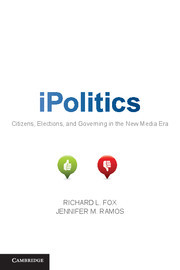Description
iPolitics
Citizens, Elections, and Governing in the New Media Era
Coordinators: Fox Richard L., Ramos Jennifer M.
iPolitics describes the ways in which new media innovations change how politicians and citizens engage the political arena.
Language: English
Subject for iPolitics:
iPolitics
Publication date: 11-2011
Support: Print on demand
Publication date: 11-2011
Support: Print on demand
Ipolitics: citizens, elections, and governing in the new media era
Publication date: 11-2011
322 p. · 15.5x23.1 cm · Hardback
Publication date: 11-2011
322 p. · 15.5x23.1 cm · Hardback
Description
/li>Contents
/li>Biography
/li>
Politicians rely on Twitter, Facebook and YouTube to exercise political power. Citizens around the world also use these tools to vent political frustrations, join political groups and organize revolutions. Political activists blog to promote candidates, solicit and coordinate financial contributions and provide opportunities for volunteers. iPolitics describes the ways in which new media innovations change how politicians and citizens engage the political arena. Among other things, contributors to this volume analyze whether the public's political knowledge has increased or decreased in the new media era, the role television still plays in the information universe, the effect bloggers have had on the debate and outcome of healthcare reform, and the manner in which political leaders should navigate the new media environment. While the majority of contributors examine new media and politics in the United States, the volume also provides a unique comparative perspective on this relationship using cases from abroad.
Introduction Richard L. Fox and Jennifer M. Ramos; Part I. The Shifting Media Universe and News Consumers: 1. More sources, better informed public? New media and political knowledge Zoe Oxley; 2. Rethinking television's relationship to politics in the post-network era Jeffrey Jones; 3. Interplay: political blogging and journalism Richard Davis; Part II. Campaigns and Elections in the New Media Environment: 4. YouTube and TV advertising campaigns: Obama vs McCain in 2008 Anne Crigler, Marion Just, Lauren Hume, Jesse Mills and Parker Hevron; 5. E-campaigns in Old Europe: observations from Germany, Austria, and Switzerland Urs Gasser and Jan Gerlach; 6. The rise of web-campaigning in Finland Tom Carlson and Kim Strandberg; Part III. Civic Mobilization and Governance in the New Information Age: 7. Preaching to the choir or converting the flock: presidential communication strategies in the age of three medias Matthew Baum; 8. Twitter and Facebook: new ways for members of Congress to send the same old messages? Jennifer L. Lawless; 9. The dog that didn't bark: Obama, Netroots Progressives, and healthcare reform Matthew R. Kerbel; 10. New media and political change: lessons from internet users in Jordan, Egypt, and Kuwait Deborah Wheeler and Lauren Mintz.
Richard L. Fox is an Associate Professor of Political Science at Loyola Marymount University. He is the co-author of It Still Takes a Candidate: Why Women Don't Run for Office (Cambridge, 2010) and Tabloid Justice: The Criminal System in the Age of Media Frenzy, 2nd edition (2007), as well as co-editor of Gender and Election, 2nd edition (Cambridge, 2009).
Jennifer M. Ramos is an Associate Professor of Political Science at Loyola Marymount University. Her research focuses on understanding the causes and consequences of political change, with an emphasis on the role of ideas, norms and identity. Her work has appeared in the Journal of Politics, Public Opinion Quarterly, International Studies Perspectives, the Journal of Political Ideologies and Human Rights Review.
Jennifer M. Ramos is an Associate Professor of Political Science at Loyola Marymount University. Her research focuses on understanding the causes and consequences of political change, with an emphasis on the role of ideas, norms and identity. Her work has appeared in the Journal of Politics, Public Opinion Quarterly, International Studies Perspectives, the Journal of Political Ideologies and Human Rights Review.
© 2024 LAVOISIER S.A.S.




